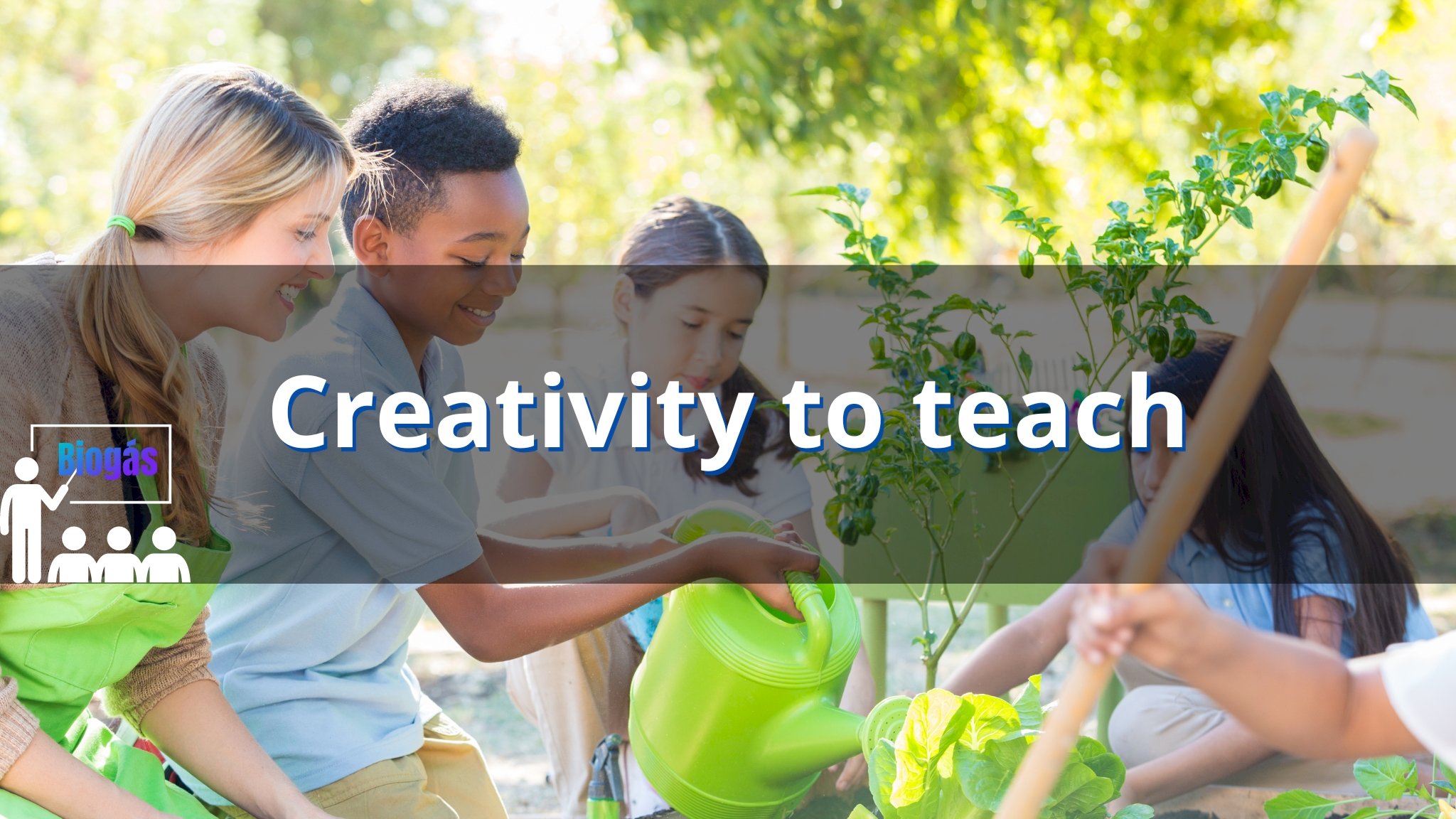Creativity in Teaching about Biogas
Reading time: approximately 5m6s
Ignite students' creativity by connecting education and biogas, turning waste into learning and sustainable actions. In this context, teaching about biogas brings a new perspective: the school biodigester as a laboratory of possibilities.

Exploring Creativity in Teaching: Connecting Education and Sustainability with Biogas
Discover How to Turn Waste into Learning Opportunities
Introduction
In a world filled with urgent socio-environmental challenges, it is undeniable that education plays a fundamental role in building a more sustainable future for the next generations. Within this context, schools emerge as fertile ground where creativity and innovation can flourish, paving the way for converting knowledge into impactful actions that bring positive change.
In the face of this scenario, the integration of biodigesters into school facilities for biogas and digestate (biofertilizer) generation stands out as a remarkable opportunity to bridge the gap between theoretical learning and practical application.
Initiatives like this not only promote environmental education in school communities but also serve as a catalyst for the emergence of new and sustainable solutions to tackle the complex challenges of our current times.
Biodigester as a Teaching Strategy
To fully harness the potential of this biometanization technology, it is absolutely essential to encourage creativity and active involvement of students at every stage of the process.
From the conception of the biodigester to the application of biogas and digestate, students can play a fundamental role in seeking innovative and sustainable solutions to both school and community challenges.
As a center of learning and catalyst for social transformation, the school has the responsibility to inspire and empower students to become agents of change. By creatively and innovatively exploring the potential of biodigesters (anaerobic reactors), the school paves the way for building a more sustainable future, where environmental education consolidates as an indispensable tool in solving global socio-environmental problems..
Now, let's explore some ideas to integrate education into the use of biogas in schools:
-
Kindling the Flame of Knowledge
Illuminating Schools: Imagine rural schools illuminated by biogas generated from their own organic waste! A reality that connects learning to sustainability, inspiring students and communities.
Educational Kitchens: Biodigestion powering school kitchens, providing clean energy for food preparation. A practical lesson in sustainability and healthy eating with every meal.
Green Laboratories: Biodigesters as teaching tools in science and biology laboratories. Students observing organic matter decomposition in real-time, learning about microorganisms and natural cycles.
-
Planting Seeds of Sustainability
School Garden and Digestate: A school garden for schools with biodigesters, where students cultivate food and generate digestate simultaneously. A comprehensive experience that connects agriculture, sustainability, and healthy eating.
Biogas Workshops: Practical workshops for students of all ages, teaching them to build mini biodigesters for residential or rural use, aiming to explore biogas potential. A playful and engaging way to raise environmental awareness.
Idea Competitions: Creative challenges for students to propose innovative solutions using anaerobic systems in daily life. An opportunity to stimulate critical thinking, creativity, and social responsibility.
-
Harvesting the Fruits of Bio-Knowledge
Research and Innovation: Schools as research and innovation centers in biogas, developing new technologies and improving processes. Students and teachers engaged in the pursuit of a more sustainable future.
Technical Visits and Exchange: Exchange between schools using biogas production systems, sharing experiences and learnings. A knowledge network that strengthens the implementation of this technology nationwide.
Biogas Fairs: Science and technology fairs focusing on biogas, where students present their projects and research. A platform to celebrate the creativity and potential of youth for a greener future.
-
Weaving a Web of Environmental Awareness
Lectures and Debates: Lectures and debates with biogas, renewable energy, and sustainability experts for students, parents, and the community. A space to deepen knowledge and foster dialogue about the challenges and opportunities of the energy transition.
Awareness Campaigns: Awareness campaigns about the benefits of biogas and the importance of organic waste management. Students as change agents, disseminating knowledge and inspiring sustainable actions in their communities.
Community Partnerships: Partnerships between schools, communities, and businesses for the construction of community biodigesters. A joint effort to promote sustainable local development and generate new opportunities for the community.
-
lluminating the Path to a Sustainable Future
Biogas, as a journey to the future: An interdisciplinary project that accompanies the installation and operation of a biodigester in school, exploring its social, environmental, and economic impacts. A learning journey that connects theory and practice, preparing students for the challenges of the future.
Young Biogas Program: A youth-led movement, using biogas production systems as a tool to promote sustainability in their communities. A powerful voice to inspire actions and build a greener and fairer future for all.
Biogas, illuminating and warming tomorrow: A writing or audiovisual production contest challenging students to imagine a future where biogas is widely used, contributing to a more sustainable planet. An opportunity to stimulate creativity and environmental responsibility among the new generations.
Conclusion
The use of benchtop biodigesters, pilot projects, or simply small-scale reactors in schools represents more than just the implementation of a new technology. It is a unique opportunity to awaken creativity, promote environmental education, and inspire new solutions to present challenges. Through active student participation, the school becomes a space for transformative learning, where knowledge connects to action, building a greener and more sustainable future for all.
With these ideas and a touch of creativity, you, as a teacher, can create an inspiring narrative that combines education and biogas, inviting students to reflect on how a simple waste can be transformed into a valuable resource. It is uncomplicated initiatives like these that pave the way for a more sustainable future. How about we explore this journey together?
Biogas & Education
At Energia e Biogas Portal, we are committed to supporting teaching and research in the field of biogas.
We offer educational methodologies, specialized courses, and practical guidance for students and educators interested in exploring this promising technology.
We are available to provide support and resources that can enrich the learning experience and contribute to the advancement of knowledge in biogas.
Contact us at contato@energiaebiogas.com.br to learn more about how we can collaborate on your educational or research project.
Together, we can drive innovation and sustainability through biogas.
Did you like the subject?
Want to learn more about biogas in Brazil?
All rights reserved - Energia e Biogas Portal ®.











NOTICE! The space for comments is intended for a healthy debate of ideas. Posts containing inappropriate expressions or personal attacks on the publication team, another user or any identified group or individual will not be accepted. If this occurs, we reserve the right to delete the comment to maintain a respectful environment for discussion.